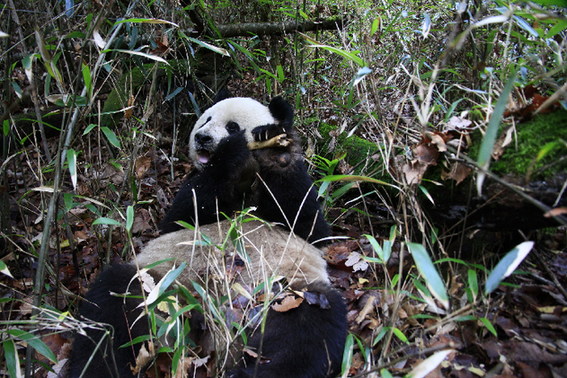Panda 'ate leg bone for calcium'
 0 Comment(s)
0 Comment(s) Print
Print E-mail Xinhua, November 15, 2014
E-mail Xinhua, November 15, 2014
A wild giant panda spotted munching on the leg bone of a dead animal might be doing so to supplement calcium in its diet, experts at a northwestern Chinese nature reserve said.
 |
|
A wild giant panda is spotted munching on the leg bone of a dead takin at the Foping Nature Reserve in Shaanxi Province. [Photo/Foping Nature Rese] |
It is rare for the bamboo-munching bears to be seen eating bones of other animals, but researchers at the Foping Nature Reserve in Shaanxi Province said they observed the panda consume about half of the leg bone in 20 minutes during a patrol through the reserve's bamboo forest on Tuesday.
The bone was later confirmed to belong to a takin that had died of natural cause, said Liang Qihui, a senior engineer of the reserve who was at the site.
Experts at the reserve say the panda's appetite for animal bones may derive from the need to supplement calcium and calories during winter -- studies have shown that often middle-aged and elderly pandas suffer from osteoporosis, a bone disease related to insufficient calcium intake.
There have been reports about wild pandas eating dead animal bodies, and panda dung at the reserve was often found to contain remains of birds and other animals, showing the vegetarian bear's occasional consumption of meat.
In 2011, photos captured by a hidden infrared camera in Pingwu County, southwest Sichuan Province, showed a wild panda dining on a gnu's corpse.
Situated at the southern side of the Qinling Mountain, the Foping Nature Reserve is well-known in China for chances to observe the endangered bears in wild. Scientists and local villagers have recorded rarely seen moments in the lives of wild panda from swimming in a river, encounters with dogs and horses, and carrying cubs on their back through snow.






Go to Forum >>0 Comment(s)